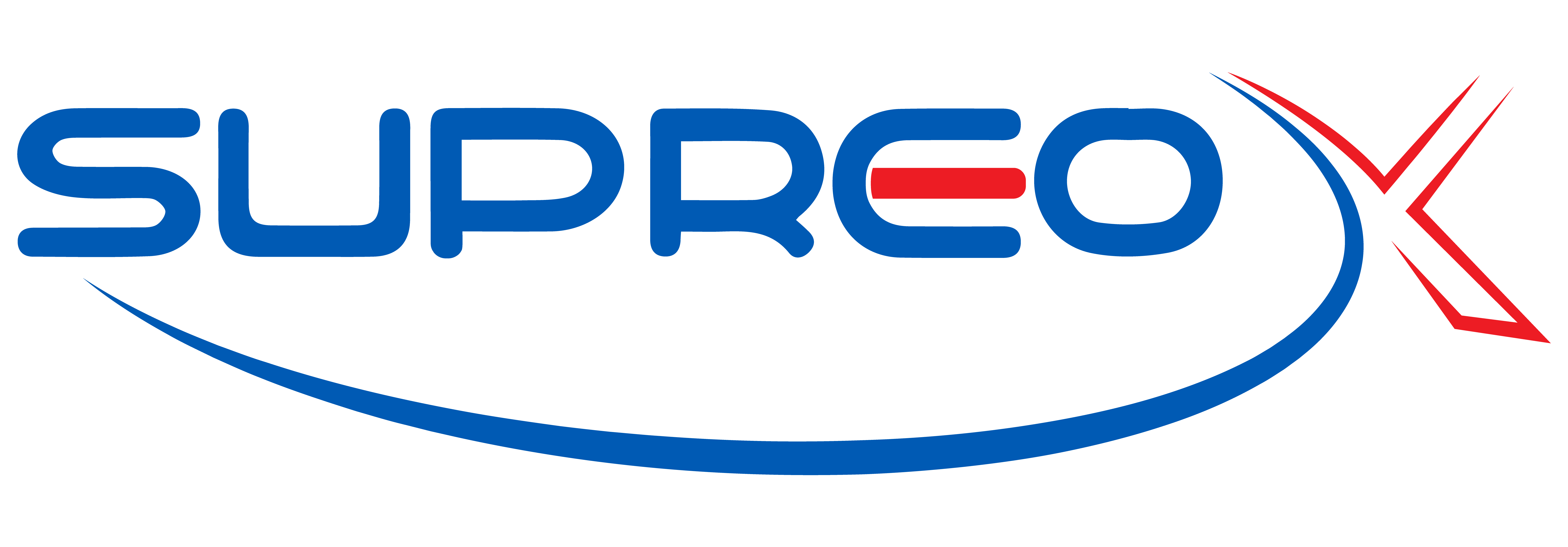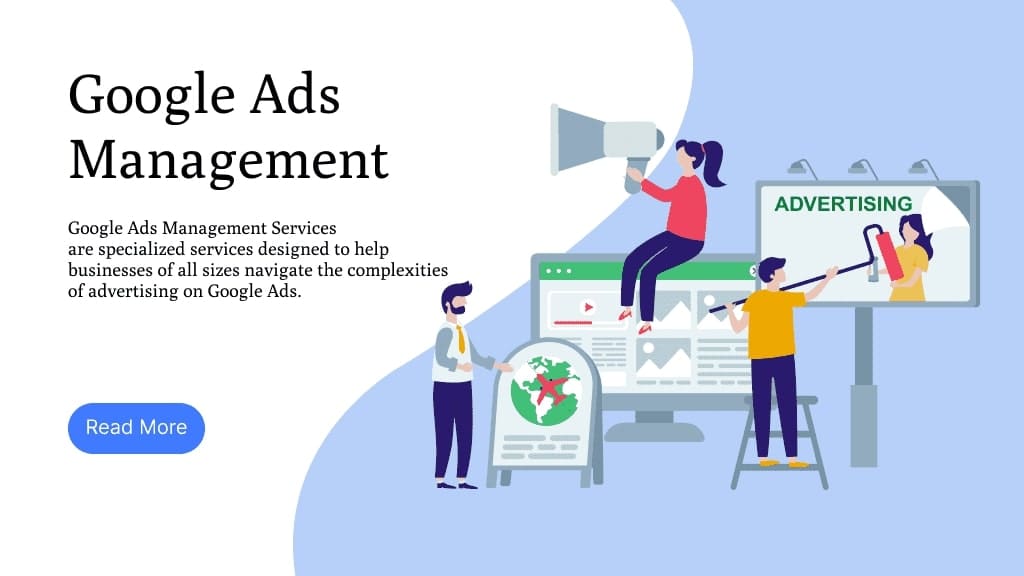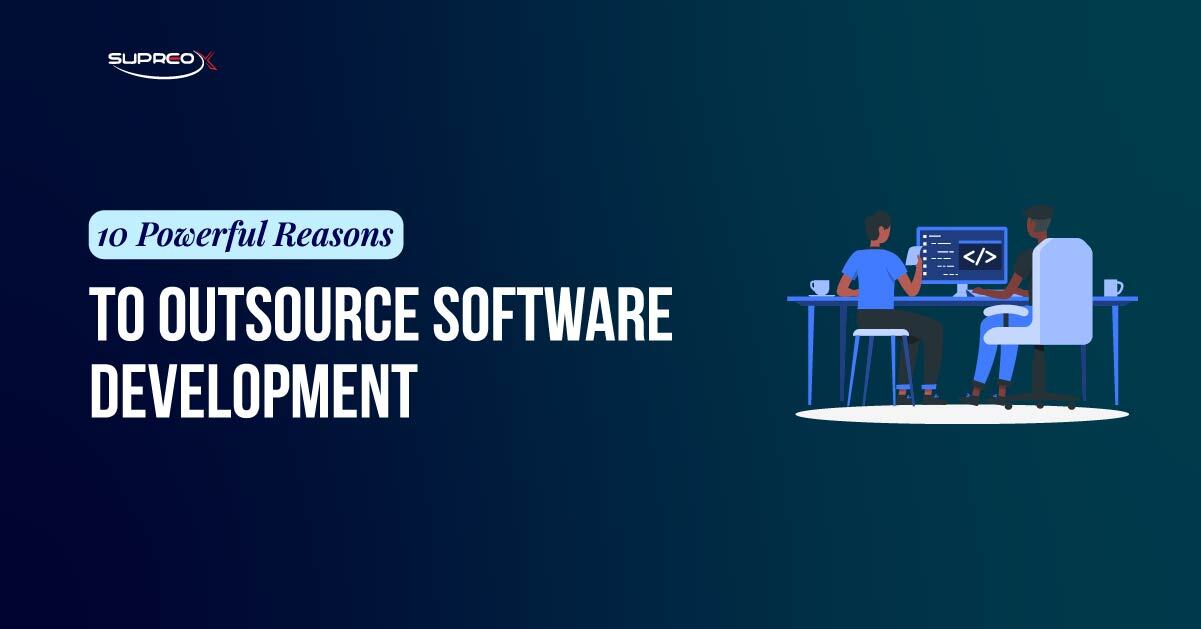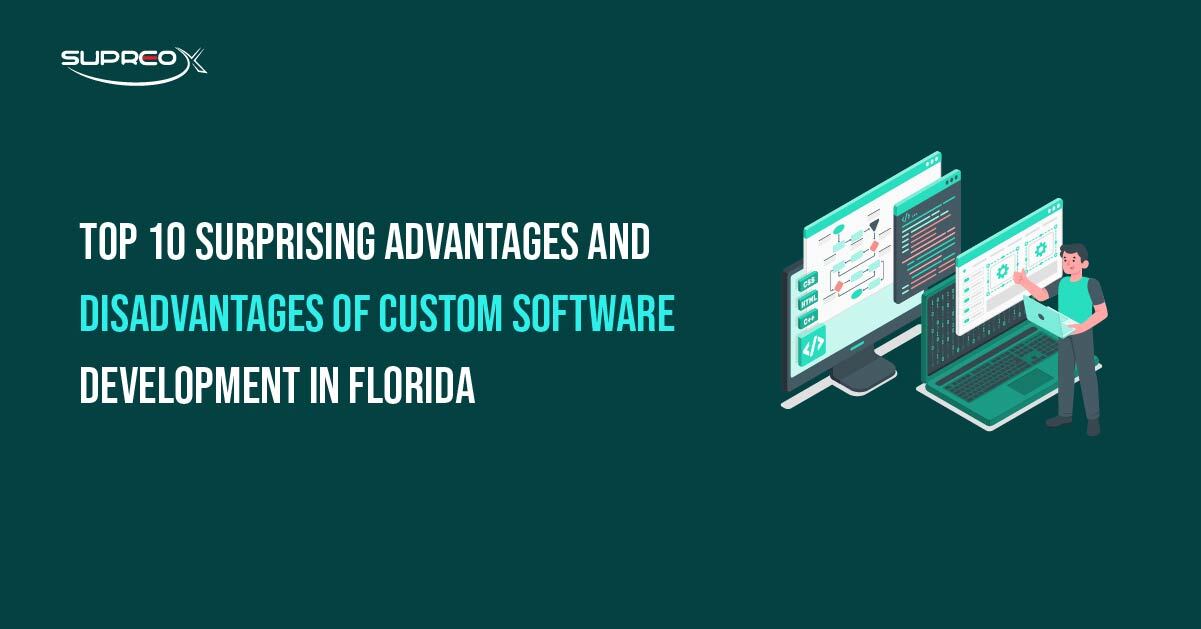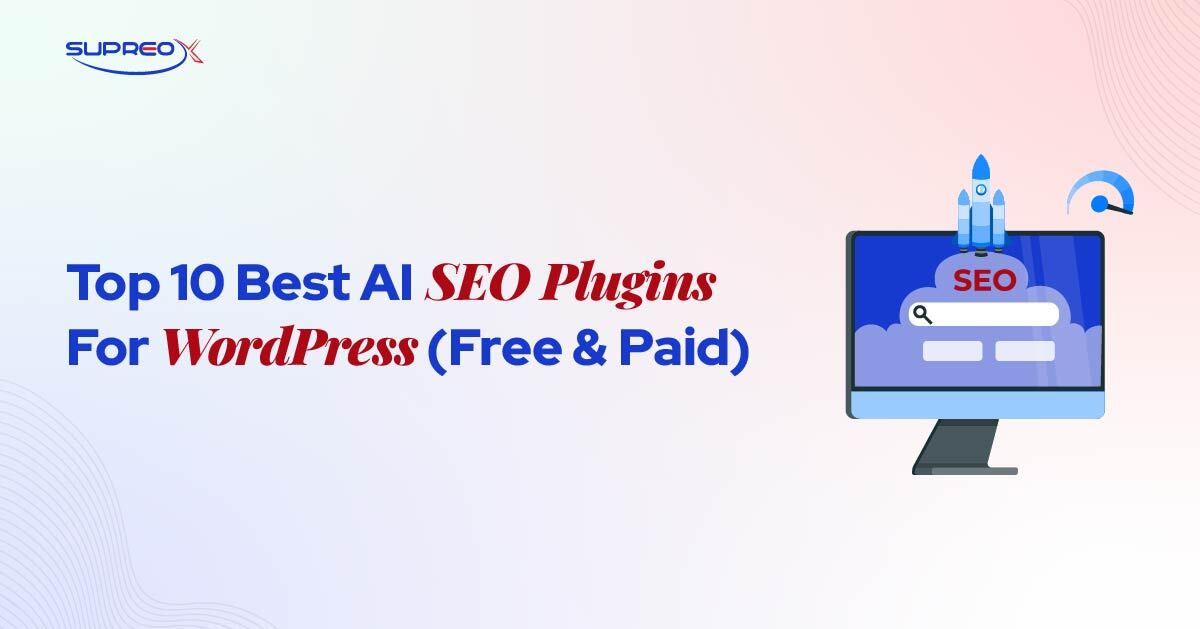Google Ads Management Services are specialized services designed to help businesses of all sizes navigate the complexities of advertising on Google Ads campaigns. These services encompass everything from ad creation and optimization to strategic planning and analytics.
With the primary goal of maximizing return on investment (ROI), Google Ads management services ensure that every ad dollar spent contributes to achieving business objectives.
What Makes Google Ads Management Services Essential?
Whether you’re a startup or an enterprise brand, professional management turns your Google Ads account from a cost center into a revenue-generating machine. Learn why!
Expertise and Experience
Professionals specializing in Google Ads management bring a wealth of knowledge and experience, ensuring that campaigns are optimized for the best possible outcomes.
Time-Saving
Managing a Google Ads campaign can be time-consuming. Outsourcing this task allows businesses to focus on their core activities while experts handle online advertising.
Cost Efficiency
Expert management can significantly reduce wasted ad spend by targeting the right audience and using the most effective keywords and bidding strategies.
Dynamic Optimization
Google Ads campaigns require continuous monitoring and adjustments. Management services ensure your campaigns are constantly optimized according to the latest data and trends.
Key Components of Google Adwords Services:
Keyword Research: Identifying the most effective keywords your target audience is searching for.
Campaign Setup and Management: Creating and managing campaigns that align with your business goals.
Optimization: Regularly optimizing campaigns for better performance, including adjustments to bids, ads, and keywords.
Analytics and Reporting: Providing detailed reports on campaign performance, insights, and recommendations for further optimization.
Google Adwords Management Services are about managing ads and driving measurable business growth through strategic online advertising. Whether you want to increase website traffic, generate leads, or boost sales, these services help you achieve your marketing objectives efficiently and effectively.
How Do Google Ads Work?

Google Ads operates on a pay-per-click (PPC) advertising model, allowing businesses to advertise their products or services on Google’s search engine results pages (SERPs) and its advertising network. The essence of how Google Ads works is straightforward yet powerful, involving several key components:
Keywords and Match Types
Advertisers select keywords relevant to their business offerings. Match types determine how closely the search query needs to match the keyword.
Ad Auctions
Every time a user performs a search, Google runs an auction to determine which ads will be displayed, their order, and by which advertiser. This auction is based on the bid amount, ad quality, and the ad’s relevance.
Quality Score
Google assesses the quality of your ads, keywords, and landing pages. A higher Quality Score can lead to lower costs and better ad positions.
Bidding Strategies
Advertisers can choose from several bidding strategies, such as cost-per-click (CPC), cost-per-impression (CPM), or cost-per-acquisition (CPA), depending on their campaign goals.
Understanding how Google Ads works is crucial for advertisers to leverage the platform’s full potential. Businesses can create effective campaigns that drive meaningful results by focusing on these foundational aspects.
Google Ads Campaign Management Process

Managing Google Ads involves a series of strategic steps to ensure your campaigns are effective, efficient, and aligned with your business goals. Here’s an in-depth look at the Google Ads Campaign Management Process:
Keyword Research and Selection
Use Keyword Research Tools: Leverage tools like Google Keyword Planner and Ahrefs to find high-volume, relevant keywords your target audience is searching for.
Analyze Competitor Keywords: Review your competitors’ keywords to uncover new opportunities and gaps in your keyword strategy.
Campaign Setup and Structure
Choose the Right Campaign Type: Select the type that aligns with your goals, such as Search, Display, or Shopping campaigns.
Organize Campaigns and Ad Groups: Structure your campaigns and ad groups for easy management and optimization. Use a logical hierarchy that reflects your products/services and target keywords.
Monitor and Optimization
Regularly Review Campaign Performance: Use Google Ads and Google Analytics to monitor your campaigns’ performance and identify areas for improvement.
A/B Testing: Continuously test different elements of your campaigns, including ad copy, keywords, and landing pages, to find the most effective combinations.
Adjust Based on Data: Make data-driven decisions to optimize your campaigns, such as pausing underperforming ads, refining keyword lists, and adjusting bids.
Effective Google Ads management is an ongoing process of refinement and optimization. By following these steps, businesses can ensure their Google Ads campaigns are strategically aligned, targeted, and optimized for the best possible results.
Google Ads Management Services for All Types of Businesses
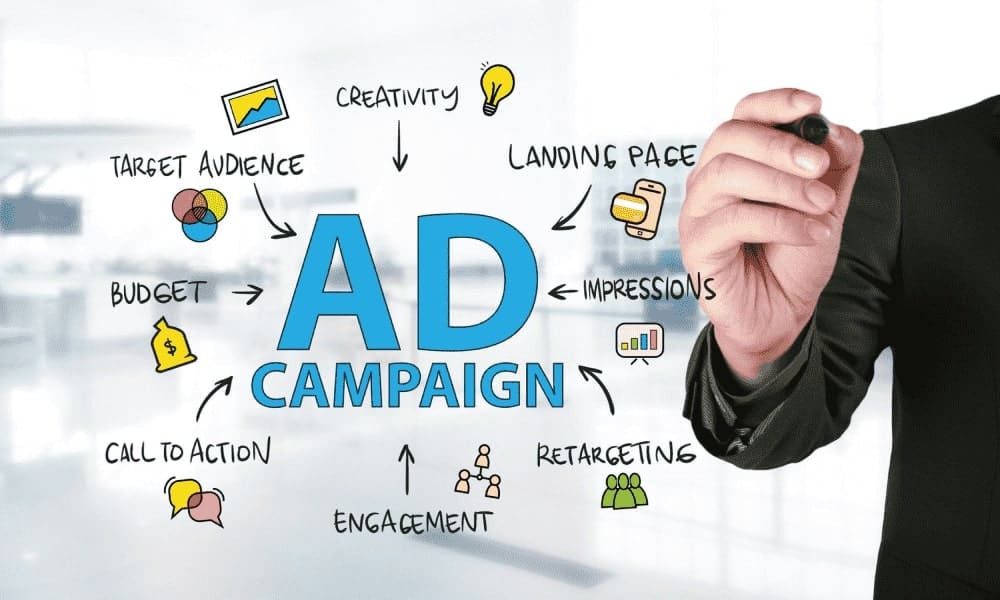
Google Ads Management Services offer versatile solutions that can be tailored to meet businesses’ unique needs and objectives across various industries. Whether you’re a small local shop, a growing e-commerce platform, or a large corporation, these services can drive significant value, enhancing your online visibility and driving targeted traffic to your site.
Benefits of Google Ads Management Services for Different Business Types:
Small and Local Businesses
Local Targeting: Google Ads allows small businesses to target potential customers within a specific geographic area, making it ideal for businesses relying on local foot traffic or clientele.
Budget Control: Small businesses can control their advertising spend with Google Ads’ pay-per-click model, ensuring they only pay for actual results (clicks).
Measurable ROI: With detailed tracking and analytics, small businesses can see exactly how their ads perform and adjust their strategies for better results.
E-commerce Businesses
Product Listing Ads: Google Shopping campaigns showcase your products directly in search results, providing a direct path for users to purchase, which can significantly boost sales.
Global Reach: E-commerce platforms can use Google Ads to reach potential customers worldwide, expanding their market beyond local boundaries.
Dynamic Remarketing: This feature allows e-commerce sites to show ads to users who have previously visited their site, displaying specific products that the user viewed, thereby increasing the chances of conversion.
Service Providers and B2B Companies
Lead Generation: Google Ads can be an effective tool for generating leads. Service providers can use targeted keywords and compelling ad copy to attract potential clients.
Highly Targeted Campaigns: B2B companies can use Google Ads’ detailed targeting options to reach decision-makers within specific industries, job functions, or companies.
Conversion Tracking and Analytics: Service providers can understand which ads and keywords are driving valuable client inquiries by tracking conversions and utilizing Google Analytics.
Google Ads Management Services provide a powerful tool for businesses looking to enhance their online presence and drive targeted traffic. By understanding the unique benefits these services offer to different types of businesses, companies can effectively leverage Google Ads to achieve their marketing and growth objectives.
Types of Google Ads Campaigns

Google Adwords PPC offers several campaigns designed to meet different marketing goals and target audiences through various channels. Understanding each campaign type’s capabilities and best uses can help you select the most effective strategy for your business needs.
Search Campaigns
Description: Search campaigns display text ads on Google search results pages when users search for keywords related to your products or services.
Key Benefits: Immediate visibility on Google, high intent targeting, and direct response from potential customers.
Display Campaigns
Description: Display campaigns show visual ads across Google’s Display Network, which includes over two million websites, videos, and apps.
Key Benefits: Extensive reach, targeting options based on interests and demographics, and the ability to re-engage visitors with remarketing.
Shopping Campaigns
Description: Shopping campaigns promote your products by showing users detailed product information, such as image, price, and merchant name, before they click on your website.
Key Benefits: High-quality leads, better conversion rates, and easy integration with Google Merchant Center.
Video Campaigns
Description: Video campaigns display ads on YouTube and across Google’s Display Network.
Key Benefits: Large, engaged audience on YouTube, various ad formats to suit different goals, and visual storytelling to capture attention.
App Campaigns
Description: App campaigns promote your mobile app across Google’s entire suite of advertising channels, including search, display, YouTube, and the Google Play Store.
Key Benefits: Simplified ad creation process, broad platform reach, and automated targeting and bidding.
Local Campaigns
Description: Local campaigns are designed to drive foot traffic to physical stores by showing ads across Google’s properties, including search, display, Maps, and YouTube.
Key Benefits: Automated ad placement and optimization, integration with Google Maps, and targeting based on proximity to your location.
By understanding the different types of Google Ads campaigns and their specific benefits, you can more effectively target your desired audience, achieve your marketing goals, and maximize the ROI of your advertising efforts.
Solve Common Google Ads Issues
Running Google Ads campaigns can sometimes lead to challenges that impact performance. Identifying and addressing these common issues is crucial for optimizing your campaigns and achieving better results.
Low Click-Through Rate (CTR)
Problem: A low CTR indicates that your ads are not compelling enough for users to click on them.
Solutions:
Refine Ad Copy: Make your ad copy more engaging and relevant to your target audience. Test different headlines and descriptions to see what resonates best.
Use Ad Extensions: Implement ad extensions to make your ads larger and provide more valuable information, like links to specific parts of your website, your phone number, or customer reviews.
Targeting Refinement: Review and adjust your targeting settings to ensure your ads are shown to the most relevant audience.
High Cost-Per-Click (CPC)
Problem: High CPC can deplete your budget quickly without necessarily improving campaign performance.
Solutions:
Keyword Optimization: Focus on long-tail, less competitive, and typically less expensive keywords. Refine your keyword list continually to include only those most relevant to your offering.
Improve Quality Score: Enhance your ad relevance and landing page experience to improve your Quality Score, which can help lower your CPC.
Adjust Bidding Strategy: Consider switching to a different bidding strategy that might be more cost-effective for your goals, such as manual CPC bidding, which gives you more control over bid amounts.
Low Conversion Rate
Problem: A low conversion rate indicates that users click on your ads but do not take the desired action on your site.
Solutions:
Landing Page Optimization: Ensure your landing pages are closely aligned with your ad messages and are optimized for conversions. This includes clear CTAs, fast load times, and mobile responsiveness.
Offer Clarity: Make sure your offers are clear and compelling. Upon landing on your page, users should immediately understand the value of what you’re offering.
Use Remarketing: Remarketing can help you attract potential customers who previously interacted with your website but did not convert.
Why Choose SupreoX for Managing Your Google Ads?
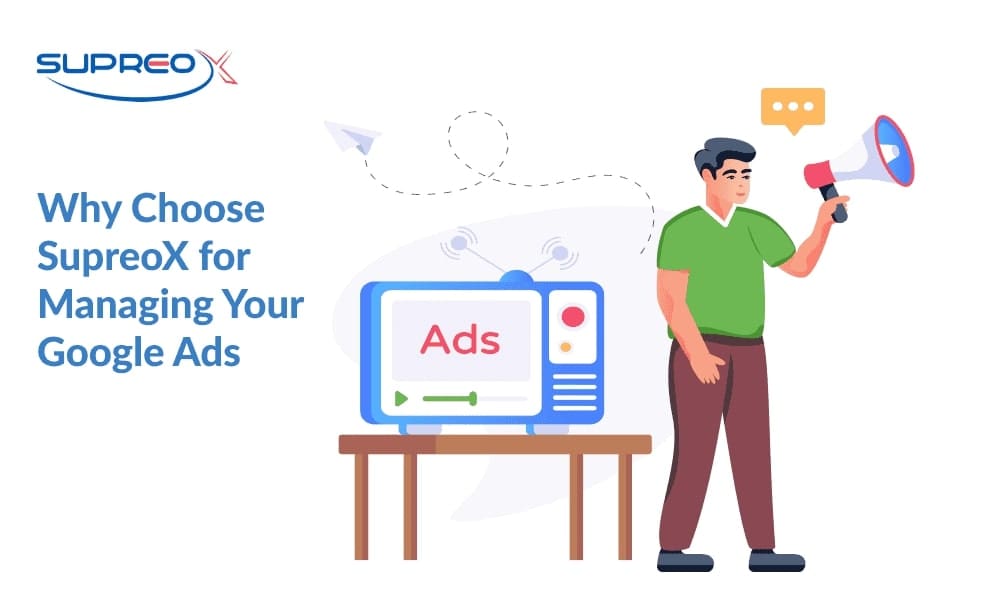
Choosing the right partner to manage your Google Ads campaigns can significantly impact the success of your online advertising efforts. SupreoX is a premier choice for businesses looking to maximize their Google Ads performance due to its combination of expertise, technology, and personalized service.
Expertise and Experience
Certified Professionals: SupreoX’s team comprises Google Ads-certified professionals with extensive industry experience. This expertise ensures that your campaigns are managed by experts who understand how to navigate the complexities of Google Ads.
Proven Track Record: With a history of successful campaigns, SupreoX has demonstrated its ability to deliver results, including increased traffic, higher conversion rates, and improved ROI for its clients.
Advanced Technology
Cutting-Edge Tools: SupreoX utilizes the latest tools and technology for keyword research, campaign management, and performance tracking. This access to advanced resources helps make data-driven decisions that enhance campaign effectiveness.
Analytics and Reporting: Clients receive detailed reports and insights, making it easy to understand campaign performance and the value SupreoX brings to your Google Ads efforts.
Entrusting your Google Ads management to SupreoX allows you to leverage their expertise and resources to enhance your advertising performance, achieve your marketing objectives, and grow your business.
Also, SupreoX’s experienced developers and marketers work closely with clients to understand their unique needs and goals. They specialize in WordPress website design and development, Shopify development, mobile app development, software development, search engine optimization, social media marketing, and Google Ads management services.
Google Ads Analytics and Reporting

Effective use of Google Ads analytics and reporting is essential for understanding the performance of your campaigns, making informed decisions, and optimizing for better results. Analytics provides the data and insights necessary to measure your success against your objectives and identify opportunities for improvement.
Key Metrics to Monitor
Click-Through Rate (CTR): Measures the effectiveness of your ad copy and relevance to your target audience.
Conversion Rate: Indicates how well your ads and landing pages drive the desired actions.
Cost Per Conversion: Helps assess the efficiency of your ad spend in achieving your business goals.
Quality Score: Provides feedback on the relevance of your keywords, ads, and landing pages.
Return On Ad Spend (ROAS): Measures the overall effectiveness of your campaigns in generating revenue relative to your ad spend.
Leverage Analytics for Continuous Improvement
The ultimate goal of Google Ads analytics and reporting is to drive continuous improvement in your campaigns. By closely monitoring performance, understanding what works and what doesn’t, and making data-driven optimizations, you can achieve better results over time.
Test and Learn
Adopt a test-and-learn approach using analytics to guide your experiments and optimizations.
Focus on ROI
Always monitor your return on investment, ensuring that your adjustments improve metrics like CTR and conversion rate and contribute to your bottom line.
Google Ads analytics and reporting are powerful tools in the hands of marketers. With the right approach to data analysis and optimization, businesses can maximize the impact of their online advertising efforts and drive meaningful results.
Conclusion
Google Ads can be your business’s most powerful marketing tool, but only if done correctly. Google Ads Management Services take the complexity off your plate and replace it with expert strategies that bring real results.
Instead of wasting your budget on trial and error, trust pros like SupreoX to do the heavy lifting. With expert guides, you can stop worrying about ads and focus on what matters most: growing your business.
FAQs About Google Ads Management Services
How much should I budget for Google Ads each month?
Start with at least $500–$1,000. The more competitive your industry, the more you’ll need to stand out.
Can I manage Google Ads myself instead of hiring an expert?
You can, but expect a learning curve. An expert brings speed, strategy, and savings.
What results should I expect in the first 90 days?
Expect learning, testing, and optimizations. Performance typically ramps up around month 2 or 3.
How do I know if my Google Ads manager is doing a good job?
Look at ROI, CTR, and conversion volume. You should also receive consistent communication and clear reports.
Are Google Ads better than Facebook or Instagram Ads?
It depends. Google is great for intent-driven searches, but Facebook and Instagram are stronger for awareness and brand storytelling.
